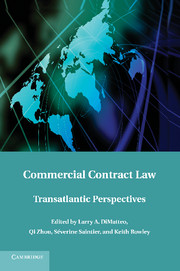Book contents
- Commercial Contract Law
- Commercial Contract Law
- Copyright page
- Dedication
- Brief Contents
- Contents
- Contributors
- Foreword
- Part I The Role of Consent
- Part II Normative Views of Contract
- Part III Contract Design and Good Faith
- Part IV Implied Terms and Interpretation
- Part V Policing Contracting Behavior
- Part VI Misrepresentation, Breach, and Remedies
- Part VII Harmonizing Contract Law
- Index
Part VI - Misrepresentation, Breach, and Remedies
Published online by Cambridge University Press: 05 February 2013
- Commercial Contract Law
- Commercial Contract Law
- Copyright page
- Dedication
- Brief Contents
- Contents
- Contributors
- Foreword
- Part I The Role of Consent
- Part II Normative Views of Contract
- Part III Contract Design and Good Faith
- Part IV Implied Terms and Interpretation
- Part V Policing Contracting Behavior
- Part VI Misrepresentation, Breach, and Remedies
- Part VII Harmonizing Contract Law
- Index
Summary
This chapter endeavours to integrate the two principal remedies for misrepresentation, namely rescission and damages. Its principal thesis is that legal certainty requires a reasonably clear delineation of the losses to be remedied by rescission and those by damages. Discretionary remedialism is to be deplored as is any tendency to treat rescission as a holistic remedy for misrepresentation. A contract is rescinded for misrepresentation because it would not have been entered into but for the misrepresentation. This justifies only the cutting away of the contract itself and the restoration of the parties to the position they were in before contract so far as the contract is concerned.
Consequential losses should be remedied by damages, but under contract law that requires an independent justification. That justification may be found in the law of torts through the actions of deceit and negligent misstatement. The chapter contends that the Misrepresentation Act 1967 does not provide a sound basis for the award of damages for misrepresentation and should in the main be repealed. The power to declare a contract subsisting under section 2(2) where rescission would be excessive should be retained but there should be no damages awarded in lieu. The treatment of misrepresentation in other common law jurisdictions, particularly in the United States, will be considered, especially in the context of remedies for losses lying beyond rescission.
A coherent system of remedies should clearly delineate the job each remedy is to do. So rescission should be confined to ‘cutting away’ the vitiated contract and should not be fashioned into a holistic remedy for misrepresentation. Rescission should thus be combined with damages by allowing it in cases where the claimant wants specific (as opposed to monetary) relief. Damages should only be awarded in a case of misrepresentation where there has been a tort, i.e. where the defendant has been dishonest (the tort of deceit) or is in breach of a duty of care (the tort of negligent misstatement). This is broadly the position in the United States and in Australia. The Misrepresentation Act 1967 and the Misrepresentation Act (NI) 1967 should be repealed so far as they provide for a damages remedy beyond the torts of deceit and negligent misstatement. These more extensive damages remedies lack moral and policy based justification and provide for more extensive relief than is available for breach of contract.
- Type
- Chapter
- Information
- Commercial Contract LawTransatlantic Perspectives, pp. 383 - 502Publisher: Cambridge University PressPrint publication year: 2013



